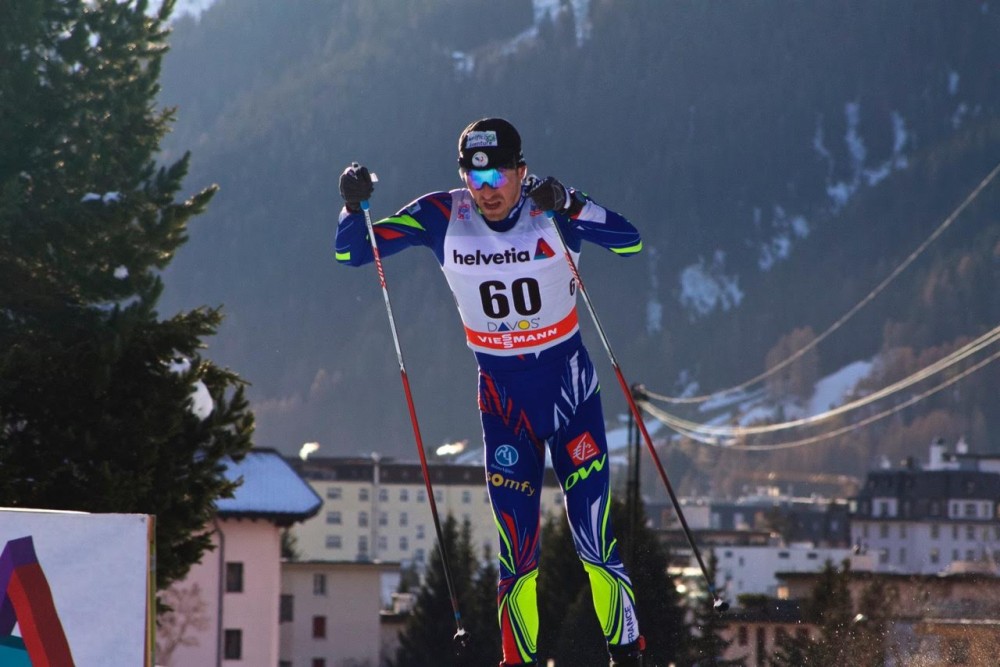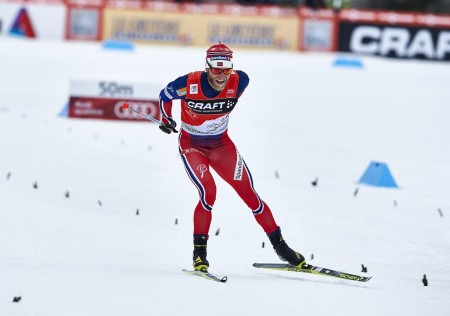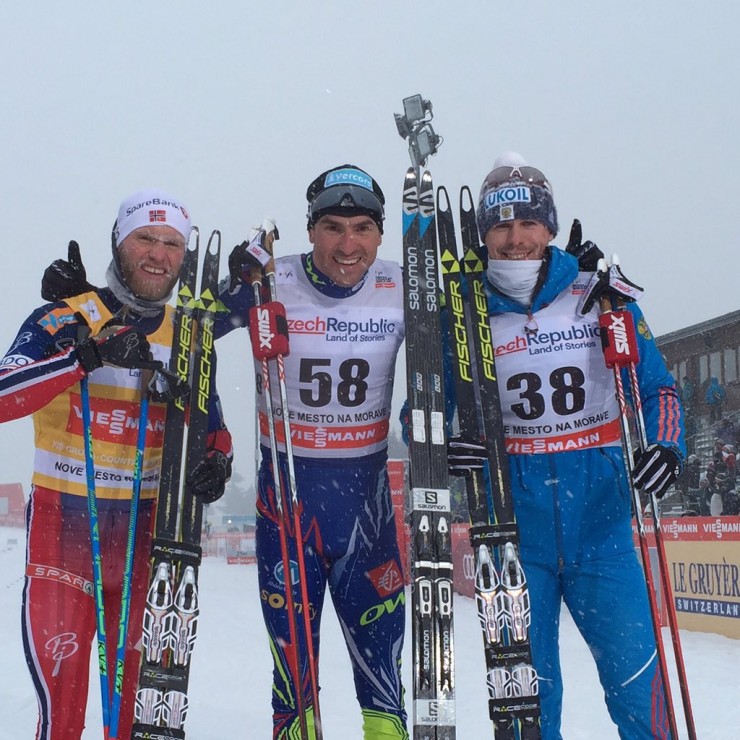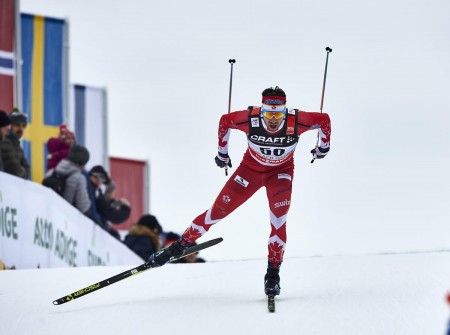
Maurice Manificat shook up the Distance World Cup standings on Saturday with his fourth-career win in the men’s 15-kilometer freestyle in Nove Mesto, Czech Republic. Unlike the thin ribbons of manmade and farmed snow snaking through brownfields during the recent Tour de Ski, Saturday’s race played out amidst steady snowfall. The trees were draped in snow. Temperatures were in the low 20s. Winter had returned.
Old Man Winter, despite his late arrival, was just another welcome sideshow for Norway’s Martin Johnsrud Sundby and his stranglehold on the Overall and Distance World Cup titles. But on Saturday, Sundby had to settle for second.
Manificat won the race in 34:04.9, by 10.8 seconds over Sundby, to achieve France’s fifth World Cup podium in the last three races (after Baptiste Gros and Richard Jouve placed second and third in the freestyle sprint a week ago, and Renaud Jay and Gros teamed up for second and Valentin Chauvin and Jouve placed third in the team sprint last Sunday in Planica, Slovenia).
Behind Manificat and Sundby on Saturday, Russia’s Sergey Ustiugov skied to third (+13.0) and Evgeniy Belov placed fourth (+29.5).
The result lifted Manificat from fourth to second in the distance standings, ahead of two other Norwegians, Sjur Røthe and Niklas Dyrhaug. While Røthe placed 28th on Saturday (ranking eighth out of nine Norwegians who finished the race), Dyrhaug did not compete in the 15 k.
For Manificat, this was his first World Cup victory this season. He last won the Davos 30 k freestyle in 2013. Two years later, back in Davos last month, Manificat came close, finishing second to Sundby in the 30 k freestyle. He went on to reach the podium in the sixth stage of the Tour de Ski: he finished third in the 10 k freestyle in Toblach, Italy.

Prior to the race, Sundby led the World Cup overall by 550 points ahead of fellow Norwegian Finn Hågen Krogh. On Saturday, Krogh finished in fifth, 32.7 seconds behind Manificat. Despite his second-place finish, Sundby buffered his overall lead by 35 points — he now leads the World Cup overall by 585 points.
Canada’s Alex Harvey posted the best result for the North American men, skiing to seventh (+41.3). Noah Hoffman, of the U.S. Ski Team, finished in the points in 27th place (+1:38.3).
Also for Canada, Devon Kershaw was outside the points for the first time in a non-stage World Cup distance race in 38th (+2:02.2). Canadian Development Team members Graeme Killick placed 63rd (+3:29.7) and Knute Johnsgaard finished 76th (+5:13.3).
For the U.S., Erik Bjornsen raced to 39th (+2:08.6). In his World Cup debut, Alaska Pacific University (APU) skier, Scott Patterson, placed 42nd (+2:10.9), and Simi Hamilton finished 65th (+3:39.0).
Two-Man Race and a Flip Flop
By the second time check, 3.5 k into the race, the foundation was laid for a two-man show. Manificat, in bib 58, had started one minute behind Sundby (bib 56), and came through the checkpoint 3.1 seconds short of Sundby, who held the fastest time. Harvey posted the third-fastest split, five seconds down.

By 5 k, Sundby held a 4.2 second gap on Manificat. Then the flip flop began.
At 8.5 k, Manificat built up an 11.6-second lead. That margin shrunk to 7.2 seconds by 13.5 k, but Manificat never relented the lead. At the finish, Manificat had buffered his margin over Sundby, winning by 10.8 seconds.
After the race in an interview with FIS, Manificat, 29, made it clear this was a race he had marked on his calendar.
“I was focused on this weekend. There are not many 15 k free technique in the World Cup calendar. I knew Martin was a favorite, but I was ready to fight,” he said. “I had excellent skis. I am very happy for the first victory of the season. I had the advantage of starting behind Martin to get all the times. I know that when I am in the best shape I can ski like today.”
Sundby, on the other hand, looked visibly tired on the podium. Yet in his post-race interview with FIS, he paid deference to a rival he sees as a threat in the 15 k skate.
“I maybe was not in my top level, but Maurice is always among the best in this distance and technique,” Sundby said. “I am happy about second place today. It was very nice tracks, which feature long and short uphills as well as turns.”
In his first race back since finishing third in the overall Tour de Ski, Ustiugov remarked that third place was a pleasant surprise after the Tour’s grind.
“I did not know how was my shape after the Tour. I spent several days at home in Russia,” he told FIS. “I started slower today to see how my body reacts. I was feeling better and better after every lap and in the last kilometers I was feeling very strong. I am happy with 3rd place.”

Harvey skied a consistent race, staying within the top 10 through every time check. Ten kilometers into the race, Harvey had ceded 27.1 seconds to winner, Manificat. In the next 3.5 k, that gap increased slightly to 39 seconds, and ultimately, Harvey finished 41.2 seconds back in seventh.
After the race, Canadian Head Coach Justin Wadsworth said on the phone from Canada that proper pacing during a 15 k is tricky business.
“If you give up 10 or 15 seconds in the first part of the race, sometimes it’s really hard to gain that back,” Wadsworth said. “If you go out and you can maintain good pace, and then you can hold on, that’s one of the days you are on the podium. That’s the way I think [Alex] skied it. Sometimes it’s just hard to hang on right at the end and you lose a little bit of time. But still, I think seventh place, that’s really fine pacing skills when you are looking at 10 or 15 seconds difference in a race that length, and with so many good guys.”
Chris Jeffries, Alberta World Cup Academy head coach, who is assisting the Canadian team in Nove Mesto, wrote in an email that Harvey had good feelings during Saturday’s race.
“He’s been doing some altitude training after Tour recovery, starting to get ready for second half of the year,” Jeffries wrote. “Good start to the race, opened up with a good first split. Always a good sign to be able to get on the pace. Faded a bit the second half, but he and his coach [Louis Bouchard] are feeling good about his fitness leading up to Oslo and the [Canadian World Cup] tour.”
Harvey could not be reached for comment.
The top American on Saturday, Hoffman, summarized his race effort in four words. “Today was brutally hard,” Hoffman wrote in an email. “The snow made for slow challenging conditions with very little opportunity to recover. I was not making the pace well on my own.”
The splits reveal that slow start. It was a pace he realized wouldn’t reflect good race execution. At 3.5 k, Hoffman already languished in 42nd place. Still on his own, Hoffman stalled a bit more in the next kilometer and a half. That’s around when Hoffman found his carrot: German Jonas Dobler, who started in bib 48.
“I was in the 50s at 5k. Soon after that, Dobler caught me from 30 seconds down,” Hoffman explained. “He was skiing well and showed me how fast I needed to be going. I was able to follow him all the way to the finish, though his pace really pushed my limits. It was the most painful race I’ve done this season.”
Hoffman remarked that his skis were good and that his post-Tour de Ski recovery had gone well. He finished the day in 27th place, whereas his pacer, Dobler, placed 16th.
World Cup Rookie

Also for the U.S., Patterson, 23, finished out his first ever World Cup race in 42nd, 2:10 behind the winner.
“This is my first World Cup. However I have starts for the rest of the season so this one could be thought of as a bit of a wake up call,” Patterson wrote in an email. “There were some nerves, but I also felt I could go into the race with absolutely no expectations as it was my first one.”
In bib 59, Patterson began the race in fast company. Manificat wore bib 58 ahead of him, and just behind him: Russia’s Alexander Legkov in bib 60.
“I think I did ok settling in, but I did go out a bit hot while feeling like I was relaxed,” Patterson wrote. “The noise, cameras, and seeding between eventual race winner Magnificat and 11th place Legkov kicked me into the race a little fast.
“My strategy was to go out and ski my own race with whatever happened,” he continued. “I didn’t really have a plan going in. More along the lines of start hard, go hard in the middle and finish hard. I figured I might be able to get a ride with Legkov, but that didn’t last very long. I executed reasonably but I think there is quite a bit more there to tap into.”
The World Cup is a big stage — a stage with added pressure, different dynamics.
“In a SuperTour, there might be 5 people with close times and only one or two that you get to ski with,” explained Patterson, who earned World Cup starts as a Period 1 U.S. SuperTour leader. “Here anybody around could be a challenge to ski with or a great ride. It throws in a much more dynamic element than just hammer.
“As it was my first World Cup, I tried to go in with no expectations,” he added. “I know that I can race right around Hoff and Bjornsen, so I figured a top 30 would be awesome, but in the thirties or forties would be alright. Beyond that I think I would have been a bit disappointed.”
Patterson will be part of the the U.S. men’s 4 x 7.5 k relay team on Sunday, along with Bjornsen, Hoffman and Hamilton.
On Saturday, U.S. Ski Team veteran sprinter Andy Newell raced to second in the 42 k classic Dolomitenlauf.
“Next time I want one of those wreath things!” Newell posted on Instagram with a photo of himself with the winner, Stanislav Řezáč of the Czech Republic, and third-place finisher. “Great experience and hard 42k of double poling today. Happy with 2nd place in the Dolomitenlauf.”
(Stay tuned for a separate report on Newell.)
Results | Overall World Cup standings | Distance World Cup standings | Relay start list
Jason Albert
Jason lives in Bend, Ore., and can often be seen chasing his two boys around town. He’s a self-proclaimed audio geek. That all started back in the early 1990s when he convinced a naive public radio editor he should report a story from Alaska’s, Ruth Gorge. Now, Jason’s common companion is his field-recording gear.



